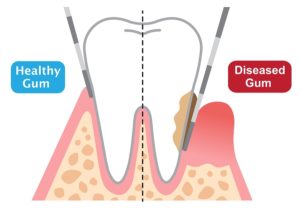 Has your dentist recommended that you receive periodontal treatment for gum disease? Gum (periodontal) disease is a serious oral health condition. If this condition is left untreated, it can destroy everything from gum tissue to teeth and bone. Our practice offers periodontal treatment including professional deep cleanings called scaling and root planing along with antibiotic therapy.
Has your dentist recommended that you receive periodontal treatment for gum disease? Gum (periodontal) disease is a serious oral health condition. If this condition is left untreated, it can destroy everything from gum tissue to teeth and bone. Our practice offers periodontal treatment including professional deep cleanings called scaling and root planing along with antibiotic therapy.
Symptoms and Causes of Gum Disease
Gum disease is characterized by infected and inflamed gingiva. This can present symptoms such as bleeding gums and bad breath. Other common symptoms of periodontal disease include:
- Tender gums
- Swelling of the gingiva
- Discoloration of the gums
- Loose teeth
- Pus along the gingiva
- Receding gums
The most typical contributor to the development of gum disease is poor oral hygiene. When we fail to remove daily plaque deposits with brushing and flossing, these deposits harden into tartar within a couple of days. Tartar will build up along the gum line and eventually collect beneath the gums. As tartar accumulates, the gums recede from teeth and become inflamed. Over time, this inflammation will lead to infected gingiva.
Scaling and Root Planing
Scaling and root planing are two forms of specialized prophylaxis that are commonly performed at the same appointment.
Using precise instruments, a dental hygienist will remove tartar deposits below the gum line through a process called scaling. This procedure effectively removes calcified debris from the roots of teeth so that the gingiva can ultimately reattach. Root planing, a separate procedure, follows scaling and involves using small files to smooth the roots of teeth. Smooth surfaces help prevent the accumulation of new tartar deposits.
Medication
Antibiotic medication might be prescribed to address the infection within the gingiva. These medications may be taken orally or applied topically. Periodontal treatment can involve applying topical medications in gel form between teeth and gums for maximum effectiveness.
If patients do not respond to treatment, our dentist may refer those with complex or advanced forms of gum disease to a specialist. A specialist may perform surgical periodontal treatments like tissue grafts and or pocket reduction surgery.
If you have questions about gum disease and periodontal treatment, call our practice to schedule a consultation.

